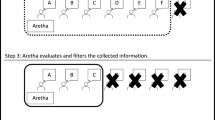Abstract
Following the experimental design used by Barrett-Howard and Tyler (1986), this study examines the importance given by West German university students to procedural and distributive justice allocation decision making. After reading one of eight scenarios in which there was a limited resource to be allocated, the subjects answered questions concerning the importance and meaning of justice. For the most part, the results correspond to previous U.S. findings of the importance of procedural justice and its definition across various allocation settings. However, the West German students placed greater importance on having mechanisms for correcting inadequate decisions than did their American counterparts. Beyond the design of the initial U.S. study, however, the West German students were asked in an open-ended format to discuss their concerns in making the allocation decision. Nearly half of the unprompted responses centered around justice issues.
Similar content being viewed by others
References
Barrett-Howard, E. (1986).A conceptual definition of procedural justice. Unpublished manuscript, Northwestern University, Evanston, IL.
Barrett-Howard, E., and Tyler, T. R. (1986). Procedural justice as a criterion in allocation decisions.J. Pers. Soc. Psychol. 50: 296–304.
Cohen, J. A. (1960). A coefficient of agreement for nominal scales.Educ. Psychol. Measur. 20: 37–46.
Deutsch, M. (1975). Equity, equality and need: What determines which value will be used as the basis of distributive justice?J. Soc. Issues 31: 137–149.
Fry, R. F., and Leventhal, G. S. (1979).Cross situational procedural preferences: A comparison of allocation preferences and equity across different social settings. Paper presented at the annual meeting of the American Psychological Association.
Greenberg, J., and Cohen, R. L. (eds.) (1982).Equity and Justice in Social Behavior Academic Press, New York.
Hays, W. L. (1981).Statistics Holt, Rinehart and Winston, New York.
Leventhal, G. S. (1980). What should be done with equity theory? In Gergen, K. J., Greenberg, M. S., and Weiss, R. H. (eds.),Social Exchange: Advances in Theory and Research Plenum Press, New York.
Lissak, R. I., and Sheppard, B. H. (1983). Beyond fairness: The criterion problem in research on dispute intervention.J. Appl. Soc. Psychol. 13: 45–65.
Sheppard, B. H., and Lewicki, R. (1984).Dimensions of justice in supervision. Paper presented at the annual meeting of the American Psychological Association.
Author information
Authors and Affiliations
Rights and permissions
About this article
Cite this article
Barrett, E.J., Lamm, H. The role of procedural justice in the allocation of limited resources: A West German perspective. Soc Just Res 3, 21–30 (1989). https://doi.org/10.1007/BF01050936
Issue Date:
DOI: https://doi.org/10.1007/BF01050936




